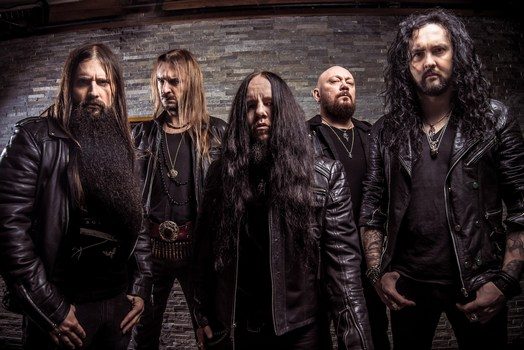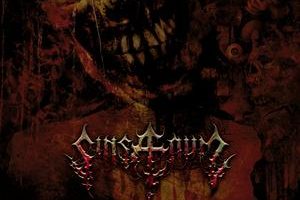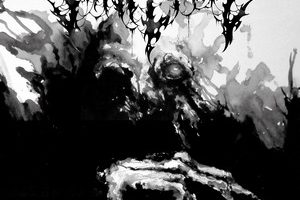Sinsaenum – Resolve to Conquer
Wednesday, 22nd August 2018
Just because something looks (and is) the quintessence of a supergroup, it doesn’t mean the road is going to be easy. Sinsaenum features members and ex-members of Dragonforce, Slipknot, Mayhem, Seth, Loudblast, and many more, so there are some added eyes looking their way, but it’s still the start of a brand new band. Sinsaenum though, have been wise to capitalize on their buzz and have been delivering a release per year since their inception in 2016.
Repulsion for Humanity is their second full-length effort, and sees them branching out further as they continue to discover who they are as a band. Incorporating more melodies while pushing a more raw sound gives them a distinct edge, and one that they can continue to build off of in their own way. We had a talk with guitarist Frédéric Leclercq about some of the things that Sinsaenum has had to overcome, the initial chemistry of the band, and how they work around admittedly busy schedules of their members.
Dead Rhetoric: Looking back to the inception of the band, or at least when the members got together, did you feel that you had to subvert expectations with having a lot of different members from non-death metal bands involved?
Frédéric Leclercq: Yeah, since I am in Dragonforce, which is pretty far from death or black metal. But then again, it’s extreme but in a different category. I had, and I still have a lot to prove. People from the underground are pretty much judging that I’m the one writing all the music, and think, “Oh, that’s the dude from Dragonforce, I’m not going to bother listening to this.” And I understand. There’s something to be said for Joey [Jordison], since he was in Slipknot, which was brutal as well but I guess it has that mainstream sound. So Joey and I have had a lot to prove, and the others are playing in death/black metal bands. I felt the pressure, but it all came naturally. This is the music that I’ve been listening to for almost 30 years. People that know me, know that it’s my kind of music. When Venom came out, it was like, “wow, finally!” So what people know about me, or what they think they know about me is just one piece.
I’m not just the guy from Dragonforce. I don’t live in a castle, playing with dragons and saving princesses all the time. If someone works in a band, they aren’t just thinking about it all the time, they have another life besides what they are doing or what they are known for. It’s the same thing with me. Some people might be puzzled that this is death metal coming from an ex-member of Slipknot and a guy from Dragonforce, and think it might not be good. Don’t be fooled. I know my shit, and I love death metal. I’ve been playing it for about 30 years or so. So yeah, I have to prove [myself] but at the same time I don’t care. [Sinsaenum] is totally honest. It’s not like I’m jumping onto something commercial, where people would think I’m selling out. This is quite the opposite. It’s going in the wrong direction from mainstream. I hope people can appreciate that, actually.
Dead Rhetoric: As it’s been said that the band was gathered through you inviting your friends to join, were you surprised at the level of chemistry the band had at the start?
Leclercq: I was surprised, yes and no, because they were all my friends. That was the main criteria. I started the band and I wanted to do it with people who I had a good chemistry with, and were friends. That was the main point, even before we started communicating. Because I am a musician myself, I know a lot of other musicians, so I guess I tend to be around people who are technical enough to play their instrument. I could have hired people through management that were like, super fucking excellent but I had never met before. But that was not the case, I wanted to do it with people that are good, but most importantly, are my friends.
I wasn’t surprised, since they were my friends but I was a little nervous when we all gathered together in Budapest for the first time. Some of them knew each other, but you know when you host a party and there are friends from school and friends from work, sometimes it doesn’t connect. It doesn’t mix. But it did, and it was great. There was a real chemistry once we started playing and hanging out together. We did it again for the recording of the album, and we rented a house. That was cool.
Dead Rhetoric: How do you feel that you’ve stepped things up since the debut, or even last year’s Ashes EP?
Leclercq: I guess that’s the whole purpose of carrying on with the band – trying to outdo what you’ve done before. If you think you can’t do better than what you did, I think it’s time to change the formula. If you just want to do better and better, and hopefully that’s the case – the first album, I wrote everything and some of the songs were like 20 years old or so. It took a lot of time for me to do that, and come up with something. I wanted it to be a perfect death metal album, which was by the book. Like the first question you asked, I felt I had to prove something to people. I wanted a death metal album that followed the rules, respecting the codes and the genre. I also wrote the songs without knowing who was part of the band. It all started out as a project, so it didn’t matter who was going to play drums or who was going to sing. I just had songs that I wanted to sound like the death metal that I listened to.
So when I started to write for Ashes, and Repulsion for Humanity, I knew who was in the band. That helps in finding the sound. Not that I’m like, “Oh, I need to do that part because then Joey is going to do that thing he does on drums.” But somewhere in the back of my head, I know that I’m writing music with Joey in the band, and every other member. It leads you into another direction. There’s also the fact that once the album was out, and we took time to talk about it and discussed what worked. We also worked with Francis Caste, who mixed Ashes and Repulsion for Humanity, and he had us defining a sound that was more ‘us.’ The first album was more clean, and we wanted something more dirty and raw. It was more personal for Ashes, and especially for Repulsion for Humanity. He helped in creating the sound that was us. In terms of songs, there was no formula or criteria. Some were slow, some were super fast – there was no formula. It all came out. The first album was like telling a story, and it was a bit more polite. This album is more of a slap in the face.
Dead Rhetoric: I know that Attila wasn’t able to contribute quite as much this time, but what do you enjoy about being able to have multiple vocalists?
Leclercq: I think it’s great, especially on Ashes and the first album, you can distinguish the two singers. Attila is a great guy and a great friend. He’s got a very specific voice, and like you said, he couldn’t be here for this album so he only did some backing vocals here and there, and a handful of lyrics. But what he didn’t bring, it brought room for Sean [Z], and he is an amazing singer. When Attila came here to do the vocals for Ashes, we started to talk about the schedule for the next couple of years. I already knew by that time because he said then that he would not be free for the next album. So I asked if he didn’t want to be in the band, and he said no, he wanted to be in the band. He just couldn’t participate on this one.
It makes sense, because people know we have other bands beside this one. He said that we need to carry on because there’s a buzz with the band, and it would be stupid to wait for him. We had to carry on without him. For us, it’s very simple. I keep using it as an example – I don’t know if you are familiar with the TV show Dallas, but there’s one season with no Bobby [Ewing]. They called it the Dream Season. He came back the season after. That’s what is happening for us. Attila isn’t here now, but he’s still a part of the band. Sean has been doing some amazing work – there’s not a lack of something. Just because you don’t hear Attila, Sean has done so many layers. Sean is able to shine, and he’s done amazing work for this album.
Dead Rhetoric: Given the workloads of yourself and others involved, what’s the recording process look like?
Leclercq: Joey came to France in January of this year. For the previous album and EP, he did his parts in the US. It’s fine, because we are great musicians and I can trust him to do his thing and not worry. But we thought it would be better, instead of going back and forth on email – you lose a bit of that human feeling – for him to come to France and do it live. The songs and the drums did benefit from it. He came and recorded the drums, then Sean and Heimoth [bass] came in so we could do the videos. So we did the videos before the album was finished, because that’s how we work around our crazy schedules. So we worked off the demos for the videos, but the demos were very advanced.
We then did all the guitars and bass in Paris, and Sean did his vocals in the US. He did them in no time – he was so fast. We got all the lyrics, and we did a lot of pre-production work back and forth when he came to France. We worked on lyrics with him and Joey. When he went back home, we worked on the placement of the vocals. So when he went into the studio, everything was super precise. It took him 3-4 days. It was insane! Then we had Lauren [Hart] from Once Human do some guest vocals on “Sacred Martyr” that she recorded in the US at Logan Mader’s studio. We have Les Tambours du Bronx, which is a percussion band from France that is pretty mainstream, guesting on the song “Final Resolve.” We mixed and mastered everything here in Paris, and voila, here’s the album.
Dead Rhetoric: What do you find challenging about getting a new band out there, even if there are some major players on it?
Leclercq: You have to kind of start from scratch. It doesn’t add up – if you take the popularity of Dragonforce and the popularity of Slipknot and the popularity of Mayhem – it doesn’t work that way. The fact that we are called a supergroup, which I guess is the truth since we are all known for other bands, that has a negative impact on people’s minds in a way. They think that it’s just a studio thing. What we are doing with this album is that it’s not just a one-off thing. We want to carry on. That also means that we are going on tour in the end of September. It’s not the big venues we usually play. It’s all very refreshing. We are very enthusiastic about this. It’s hard to start from scratch, but we have a great label that is helping us, and we sell to more people through social media because they know us through the other bands.
We don’t take anything for granted. It’s humbling as well, because we have to fight for gigs and find our place in the overcrowded music scene. It’s interesting and very time consuming, but if we weren’t passionate about music, we wouldn’t be doing this. This is something that’s very honest and something we need to do. Joey always said that Sinsaenum is like a force above us that we have to do. I don’t believe in those things but we all go in the same direction and we have to express our feelings in a way to get it done.
Dead Rhetoric: Given the band name, do you find a lot of people who are mispronouncing or misspelling it?
Leclercq: [Laughs] I’ve heard some different pronunciations, or people adding in an “I” but we came up with the word – Joey came up with the name. I guess it doesn’t belong to us anymore. If you want to pronounce it differently, it’s up to you. We have our way of pronouncing it, but if you want to pronounce it a different way that’s fine. I don’t like when they add a letter or misspell because it’s more like dyslexia or something. But it’s Sin-sae-num, that’s the way we say it.
Dead Rhetoric: You mentioned going out in September, but is there anything else planned at this point?
Leclercq: There’s the tour, and we’ll take it as we go. We are busy with all of our other bands though. We may have another video out after the release, we will see. We are going to Europe and Russia and then Tokyo, and that takes us to November. There’s more in the making and it’s all good.
























